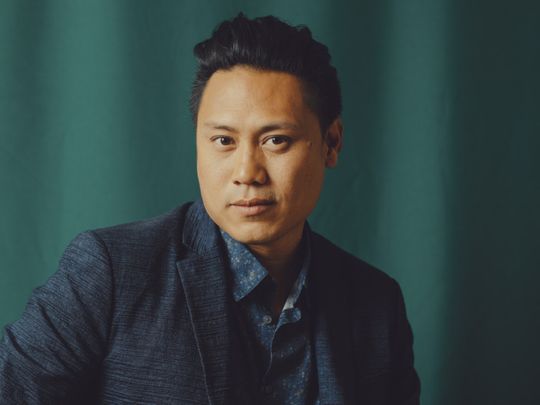
It isn’t easy to mount a big-screen romantic comedy or a film franchise without superheroes these days, but director Jon M Chu managed to do both with last summer’s hit ‘Crazy Rich Asians.’ His movie proved that audiences will turn out en masse for a project with an all-Asian cast, and when I spoke to Chu for my article on the future of movies, he said its success has rejuvenated his belief in the future of theatrical exhibition. Here are edited excerpts from our conversation.
I know it was a priority for you for ‘Crazy Rich Asians’ to come out theatrically instead of on a streamer. But do you think streaming will start to overtake theatrical distribution over the next decade?
If you had asked me two years ago where the film industry would be in 10 years, I might have had a different answer. But after what I’ve experienced with ‘Crazy Rich Asians,’ seeing the audience show up, it’s sort of reinvigorated the idea of going to the movies. That social aspect of sharing a movie with friends and strangers and family, that’s such a strong part of our tradition. The success we had with ‘Crazy Rich Asians’ would not have been possible any other way.
Is there a shift happening toward streaming? It depends. I think we’re coming into an era of tiers, where some stories are best told through streaming, and other stories have the purpose of getting people to a theatre to experience them socially.
How would you decide if a story was best suited for streaming or theatrical?
I think about, what audience am I making this for, and how do I want them to experience it? For instance, with [the forthcoming film adaptation] ‘In the Heights,’ I knew we wanted to go theatrical because it’s a musical, and we wanted people to experience it in the dark with a focus on the screen. And similarly to ‘Crazy Rich Asians,’ this is a moment to make a statement about what the audience is willing to go see. Seeing Latinx faces in the museum of cinema is important right now.
In the months leading up to ‘Crazy Rich Asians’, romantic comedies like ‘The Kissing Booth’ and ‘Set It Up’ were becoming word-of-mouth hits on Netflix. It was a reminder that people were hungry to see movies in that genre, and big studios weren’t giving them that — which created an opportunity for Netflix.
Love, hope and romance will never die, but the audience wants fresh takes on these things. There are only so many times you can do a romantic comedy before you know all the beats and you’re not surprised anymore. There are so many things asking for your time, from video games to social media, why would you spend the time and money if you’re not going to be surprised and delighted?
We just have to make our storytelling better, and that’s not an easy thing to tell studios, that we just have to be better filmmakers. Stars that drive box office are hard to come by now, so stories become even more important.
How do you think theatrical will evolve as Apple and other streamers get into the game?
I don’t think theatres are going away, but will some movies get shown to you earlier at home if you pay a certain price? Tiered pricing hasn’t worked in the past, but I think a better thing is coming. Look at the subscription services [like MoviePass]. Although it may have been too early for them right now, clearly there’s an appetite. Maybe you can see a movie a week early if you go certain places, or watch a movie earlier at home if you have a certain television. I don’t know what will happen, but I do know that the stringent walls of cinema are bending.
You’re very plugged in online. How do you see social media shaping the movie industry over the next 10 years?
It’s already had a direct effect on ticket sales, because word-of-mouth has such power now. And it’s had an effect on me.
Social media opened my eyes to issues of representation. When you’re told, ‘You can’t hire that actor because they don’t sell internationally,’ I think you start to believe it when you’re in this business. When the hashtag #StarringJohnCho was trending, it was a weird psychological thing to see John Cho photoshopped as the leads in all these movies. I felt this shift in my brain. I couldn’t forget that image, and it made me question everything: ‘Why don’t we have heroes who look like this on movie posters?’ It only reminded me of my own power.
So how do you measure that progress? When you see Henry Golding cast opposite Emilia Clarke in this coming winter’s romantic comedy ‘Last Christmas’, or Marvel readying ‘Shang-Chi’ about an Asian superhero, is that the sort of ripple effect you thought might happen when you did ‘Crazy Rich Asians’?
I am an optimist, but mostly a pessimist. [Laughs] I went into this with the hopes it would change things, but knowing that it probably wouldn’t. That’s just the way your mentality has to be in Hollywood.
When I would talk to Henry Golding, I’d say, ‘This is going to put you on the map.’ But I would also have side conversations. ‘Just so you know, there aren’t very many parts for people who look like you, and I’m not sure that will change after this movie.’ There was a whole system that had not been responding to our calls for change, so who knows? I told him, ‘Be prepared, but your path is not made.’
And now?
The fact that Awkwafina, Constance [Wu], Gemma [Chan], Jimmy [O. Yang], Ronny [Chieng] and everyone else is working? And not just them, because when they’re not available, others get jobs? Eyes are being opened to that talent, and I could not have predicted that.
What’s great about this whole movement is that instead of getting one shot at this next time, maybe we get five. I just hope we get the opportunity to fail and keep going. It makes me so hopeful when I talk to actors and directors and audience members who don’t have the same baggage I was taught coming up in the business, that heavy weight of feeling so out of place that you develop self-hatred. I think they see beyond that now.













